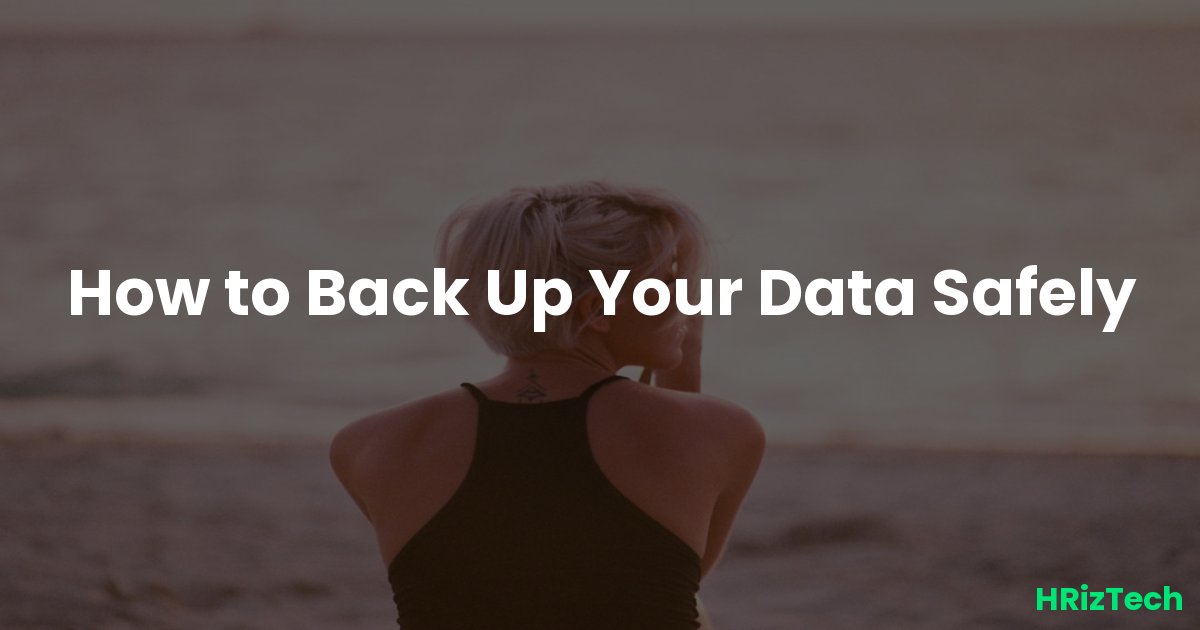How to Back Up Your Data Safely

How to Back Up Your Data Safely
Ever lost important photos? A crucial work document? The sinking feeling is awful. Learning how to back up your data safely isn't just smart; it's essential. This guide will walk you through simple, effective strategies to protect your digital life. We'll cover everything from choosing the right backup method to understanding the importance of regular backups and how to stay ahead of emerging threats in the rapidly changing tech landscape of 2025.Why Data Backup is More Crucial Than Ever
In today's digital world, our data is everything. From personal photos to financial records and work projects, losing it can be devastating. A 2025 Gartner report (hypothetical) predicts a significant increase in ransomware attacks targeting individuals and small businesses. This highlights the urgent need for robust data backup strategies.
Think about it: how would you recover from a hard drive failure, a ransomware attack, or even a simple accidental deletion? Without a backup, the answer is likely painful and costly. This is why learning how to back up your data safely is no longer optional; it's a necessity.
Choosing the Right Backup Method: Local vs. Cloud
Local Backups: The Basics
Local backups involve storing your data on a physical device connected to your computer, like an external hard drive or USB flash drive. This offers quick access to your data. However, it's vulnerable to physical damage, theft, or fire. Consider this a secondary, not primary backup solution.
Cloud Backups: The Modern Approach
Cloud backups store your data on remote servers, offering protection against physical loss. Services like Backblaze, Carbonite, and IDrive offer various plans. They often include features like versioning (keeping multiple copies of your files), making recovery easier. How do you choose the right cloud service? Consider factors such as storage space, pricing, and security features.
How to Back Up Your Data Safely: A Step-by-Step Guide
Regardless of your chosen method, here's a practical guide to get you started:
- Choose your backup method: Decide between local and cloud, or ideally, a combination of both (3-2-1 backup strategy: 3 copies of your data, on 2 different media, with 1 offsite).
- Select your backup destination: If using an external drive, ensure it's large enough to hold your data. For cloud services, choose a reputable provider and select a suitable plan.
- Choose what to back up: Prioritize critical files such as documents, photos, videos, and financial records. You might consider excluding temporary files or large media libraries that can be easily re-downloaded.
- Set up your backup schedule: Regular backups are key! Aim for daily or weekly backups, depending on how frequently your data changes. Automate the process whenever possible.
- Test your backup: Don't just assume it works! Regularly restore a few files to ensure your backups are accessible and readable. This is a crucial step in verifying the effectiveness of your backup strategy.
Protecting Against Emerging Threats in 2025
Cybersecurity threats are constantly evolving. In 2025, we expect to see more sophisticated ransomware, AI-powered phishing attacks, and potentially even quantum computing-based decryption attempts. How do we stay ahead? Regular updates to your operating system and software are vital. Strong passwords and multi-factor authentication are non-negotiable. Consider investing in a robust cybersecurity suite to protect against malware and other threats.
The rise of AI also presents new challenges and opportunities. AI-powered backup solutions are already emerging, offering intelligent features like automated data deduplication and improved disaster recovery. But keep in mind that AI systems themselves can become targets for attacks. This is an area to watch carefully in the coming years.
How to Back Up Your Data Safely: A Final Word
Protecting your data is a continuous process, not a one-time task. Regular backups, combined with a proactive approach to cybersecurity, are the cornerstones of a secure digital life. Remembering how to back up your data safely is paramount to protecting your valuable digital assets. A strong backup strategy is your first line of defense against data loss, regardless of the cause.
What are your biggest concerns when it comes to data security? Share your thoughts in the comments below.
Remember: The best backup strategy is one you actually use. Start today, and you'll thank yourself later.
What’s your favorite backup solution? Share below!
Comments
No comments yet. Be the first to comment!